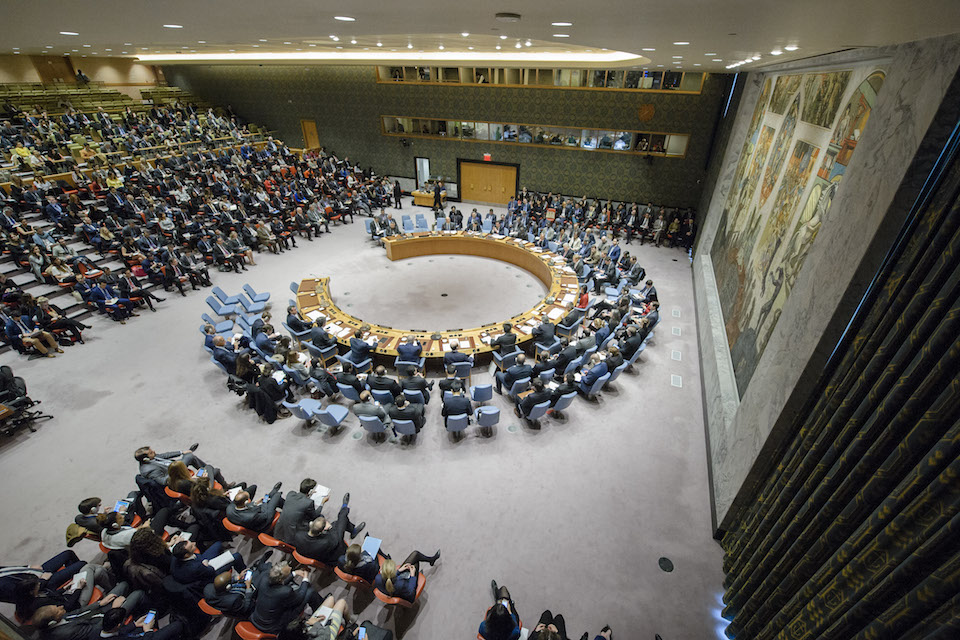"Russia has chosen to protect the perpetrators of these attacks rather than work with the rest of the international community to condemn them."
Statement by Ambassador Matthew Rycroft, UK Permanent Representative to the United Nations, following the UN Security Council vote on a resolution condemning the chemical weapons attack in Syria.

Thank you Madam President.
The conflict that has ravaged Syria has lasted for more than six years. For the people of Syria that must feel like an eternity. Here in this chamber we only get so many moments to act. Only so many moments to show them that hope is not dead; for the world to unite in condemnation of war crimes. Today was one of those moments.
What happened in Khan Sheikhoun last week was the worst of human acts. UK scientists have now analysed samples obtained from Khan Sheikhoun. And these samples have tested positive for the nerve agent sarin, or a sarin-like substance. We therefore share the US assessment that it is highly likely that the regime was responsible for a sarin attack on Khan Sheikhoun.
We recognise the need for a thorough, swift, independent investigation. Russia’s Foreign Minister has this afternoon also called for such an investigation. Yet Russia has vetoed a resolution that would support that investigation. Their messages are mixed, their aims confused. The OPCW fact finding mission, and the Syrian people, need our political support – something that we should have been able to give as a Security Council. The UK will continue to give this support, and regardless of today’s votes the work of the OPCW will continue.
We’ve once again encountered a Russian veto, the 8th time that Russia has used its veto to protect the Syrian regime. This one is even more regrettable given that Russia was the architect of the 2013 agreement to dismantle Syria’s chemical weapons programme, an initiative that has demonstrably failed.
Russia cannot now possibly claim that it opposes the use of chemical weapons. Russia has seen the same pictures that we all saw just days ago in this chamber. How could anyone look at the faces of lifeless children and choose to veto a resolution condemning those deaths?
It is indefensible that Russia has chosen to protect the perpetrators of these attacks rather than work with the rest of the international community to condemn them.
When those images and videos were broadcast across screens around the world, my team received a message from another child. From Bana Alabed, the 7 year old Syrian girl from Aleppo, who, with the help of her mother, has given the world a window into the conflict through Twitter.
The message she sent was simple: “You can make a difference. Demand justice for the children.” She is one voice, but one that echoes the views of millions of Syrians. “Demand justice for the children” – the heartbreaking truth is that a little girl’s plea will not be heard in this Chamber. Not today.
But regardless of the veto today, trust these words: we will hold the regime to account. We will continue to work with our international partners to put an end to any use of chemical weapons and to seek justice for all the victims of these heinous chemical attacks. We will gather in the OPCW in The Hague tomorrow to discuss how best to support a credible international investigation that establishes who was responsible and paves the way to hold the culprits to account.
The catastrophe in Syria is not the way it has to be. Yesterday Foreign Ministers from the G7 and key Regional Countries came together in Italy to discuss how to move forward from last week’s tragedy. They gave strong support to Secretary Tillerson’s visit to Moscow today to discuss how Russia could work with the international community to end the tragedy of the war in Syria.
Russia has the sort of influence over the regime that could bring to an end the regime’s use of chemical weapons and barrel bombs and could lead to a real ceasefire that then leads to the resumption of serious political negotiations on a political transition. Those Foreign Ministers indicated that if Russia took these steps, the international [community] would be ready to work with Russia to bring peace to Syria, defeat Da’esh and terrorism, and reconstruct Syria.
So this is the choice Moscow has in front of it. The world now waits to see if Russia will respond to the G7 and assume its responsibilities as a Permanent Member of the Security Council to help put a stop to the Asad regime’s use of chemical weapons and to work with the international community to bring this tragedy to an end.
Thank you.